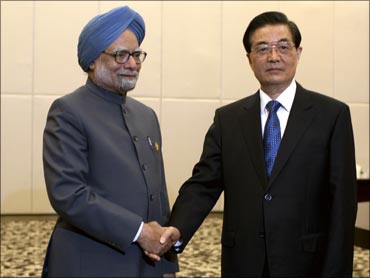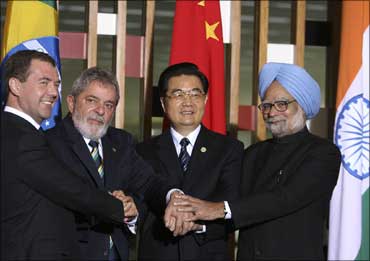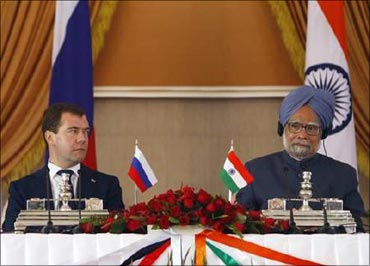
Five fastest growing economies, including India, on Wednesday vowed to oppose trade protectionism as they agreed to coordinate their positions in the multilateral fora, including the G-20 and climate change negotiations, to uphold the interests of developing countries.
The Brazil-Russia-India-China-South Africa (BRICS) Economic and Trade Ministers, who met here on the eve of the grouping's Summit, noted that the recent turmoil in Middle East and North Africa as well as the earthquake and tsunami in Japan had brought about uncertainties to the world economic development and agreed to further strengthen cooperation among themselves by expanding mutual trade and investment.
The economic and trade ministers committed to "oppose trade protectionism in all its forms," said a joint press release issued after the meeting attended by Commerce and Industry Minister Anand Sharma.
In this regard, they decided to establish a contact group entrusted with the task of proposing an institutional framework and concrete measures to expand economic cooperation among BRICS and with other developing countries, within the South-South perspective, it said.
Addressing the media, Sharma said it was imperative for the BRICS countries to coordinate their positions considering the fact that the recent developments in the Middle East and North Africa had "severely impacted" the global oil prices.
. . .

He said the five countries would be coordinating their synergies on the reforms of global institutions like IMF and World Bank besides the G-20 and WTO.
Sharma pointed out that the BRICS countries were contributing up to 25 per cent to the global GDP and had the potential to grow more.
The deliberations of the first meeting of BRICS Economic and Trade Ministers will form basis for the discussions at the Summit in Sanya on Thursday which will be attended by Prime Minister Manmohan Singh.
The ministers agreed to intensify cooperation through expanding mutual trade and investment and made a pledge to oppose all manifestations of trade protectionism, Chinese Commerce Minister Chen Deming told reporters.
. . .

To this end, the ministers agreed to establish a liaison group which will analyse the current economic cooperation and trade among the BRICS countries and assess its future trend before it puts forward an institutional framework and specific measures to expand business cooperation between the BRICS countries, he said.
"Ministers exchanged views on the state of the world economy and the role played by the BRICS in the new global economic order. They agreed in the new global economic order," said a joint press statement issued after the meeting.
"They agreed that while the world economy continues the momentum of recovery since the 2008 global financial crisis, its foundation is still far from solid and stable," the statement said the ministers pledged to continue to contribute to global economic growth.
Chen said the world economy has been recovering but the process remains "uneven and faces many risks".
. . .

He said the BRICS countries, impacted by the global financial crisis and the stimulus policies instituted by the developed economies, "still face economic overheating issues such as inflationary pressure and asset bubbles".
The ministers, therefore, called upon all the countries of the world to strengthen coordination on macro-economic policies to secure world economic recovery and achieve a strong, sustainable and balanced growth.
The BRICS ministers also pitched for inclusion of Russia in the World Trade Organisation this year, contending that it was "extremely unreasonable" for the country to be excluded in the multilateral trading system even 18 years after it applied for joining it.
"The ministers stressed that Russia's accession would make the WTO more representative and expand the influence of the multilateral trading system," Chen said.
The BRICS ministers expressed their commitment to the intensification of negotiations in Geneva to solve expeditiously all pending issues related to Russia's accession, the statement said.